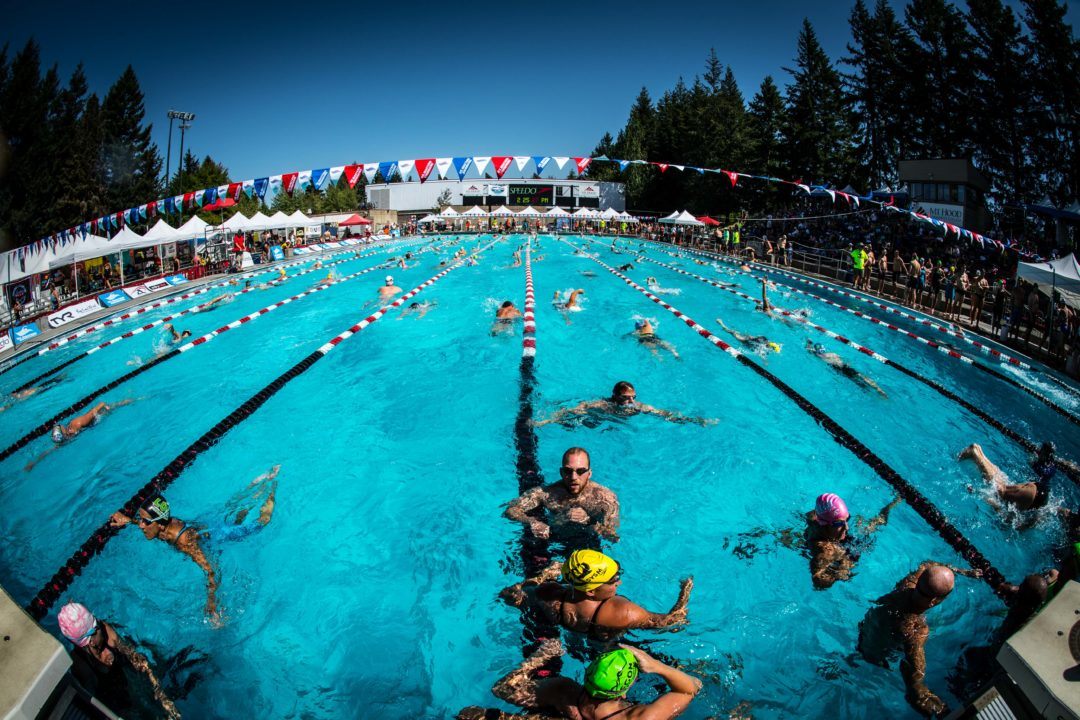Courtesy: Dr. Chelsea Ale.
Opinions in this op-ed don’t necessarily reflect the views of SwimSwam.
With Masters Diving Nationals Championships taking place this weekend, it’s the perfect time to reflect on a part of the athletic world we don’t talk about nearly enough: Masters sports.
If you only pay attention to the headlines, you might think sports are only for the young—the new recruits, the next prodigies, the Olympic hopefuls.
But there’s a group of athletes quietly training, competing, and doing something even harder than chasing a dream at 16:
They’re chasing it at 30. Or 45. Or 70.
They’re called Masters athletes.
And they deserve more attention, more celebration, and more respect.
Whether it’s diving, swimming, or any other Masters sport, the message is the same: athletes who return to competition later in life show incredible resilience, passion, and love for their craft.
Why I Care About Masters Sports
I spent most of my life in elite diving—training for it, coaching it, living it.
And for a long time, I believed the silent message the system taught us:
When you’re done winning, you’re done.
You move on.
You hang up your suit.
You walk away.
And when you do, no one really talks about what you’re supposed to do with the identity you built around being an athlete.
But then I found Masters diving.
And honestly? It gave me back a piece of myself I didn’t even realize I was still mourning.
Diving Back In—This Time, For Me
Masters diving wasn’t about scholarships or Olympic Trials or being the best.
It was about showing up for myself.
It was about rediscovering the joy that had gotten buried under years of pressure and expectation.
When I did my dissertation on women in Masters diving, I found out I wasn’t alone.
Over and over, women told me the same things:
- They had once walked away from sport because it hurt too much—physically, mentally, emotionally.
- They missed it deeply but weren’t sure if they were “allowed” to come back.
- They feared judgment about their bodies, their abilities, or their “place” in the sport.
And yet—when they returned to sport on their own terms, everything changed.
They found healing.
They found strength.
They found themselves again.
And while my dissertation focused specifically on Masters diving, these same themes—rediscovering joy, healing old wounds, and redefining personal success—show up across all Masters sports, including swimming. The emotional, mental, and physical benefits of coming back to sport later in life are universal.
Masters sport isn’t just about competition.
It’s about reclaiming your relationship with your body, your sport, and your sense of self.
Why Masters Sports Matter
Masters athletes aren’t just showing up to stay active (though that’s important too).
They’re rewriting the story about what it means to be an athlete.
They’re showing that:
- Sport isn’t about perfection. It’s about participation.
- Growth doesn’t end at 22. It keeps going—as long as you keep showing up.
- Joy isn’t reserved for the young. It belongs to everyone who loves what they do.
Physically, mentally, and socially, Masters sports transform lives:
- Physical Health: Maintaining strength, flexibility, and balance through aging.
- Mental Health: Building confidence, reducing stress, and improving body image.
- Community Connection: Creating spaces of belonging where encouragement matters more than medals.
Masters athletes show us that athleticism isn’t a phase.
It’s a lifelong way of living.
Why They’re Ignored (And Why That Needs to Change)
And yet—they’re often completely overlooked.
Most national sport organizations barely invest in their Masters divisions.
Funding is minimal. Promotion is rare. Support is patchy at best.
Facilities prioritize youth and elite athletes.
Masters practices get the worst times—or no times at all.
Championships are often afterthoughts, squeezed in wherever they’ll fit.
Even within organizations that say they care about “growing the sport,” Masters athletes are treated like relics instead of resources.
And that’s not just unfair—it’s shortsighted.
Because if you want to grow a sport, you don’t just recruit new kids.
You build pathways that keep people connected for life.
What Masters Athletes Teach Us
Masters athletes teach lessons that no medal podium can measure.
They teach:
- Resilience: The courage to return to something that once hurt you—and find joy in it again.
- Balance: The ability to love competition without letting it define you.
- Vulnerability: The bravery to show up imperfectly, visibly, joyfully.
In my research, I found that many Masters athletes—especially women—repaired years of body image damage through returning to sport.
They found empowerment not by chasing someone else’s standards, but by setting their own.
Sport became a place of healing, not judgment.
A place of belonging, not comparison.
And if that isn’t what sport is supposed to be about, what is?
Final Thoughts
As Masters athletes take the stage at Nationals this weekend, they’re doing more than just competing.
They’re reminding all of us what sport is truly about:
- Growth at every age.
- Joy in every season.
- Strength that lasts a lifetime.
We say we believe in the power of sport to change lives.
If that’s true, we have to believe it at every stage of life—not just childhood and early adulthood.
Masters athletes are living proof that passion doesn’t expire.
Talent doesn’t disappear.
Dreams don’t die when you hit a certain birthday.
Sport should be a space where people can show up, fall in love with movement, push themselves, and find community—at every age, at every ability level.
It’s time we started treating them like it.
And if you are an adult who loves an aqua sport—or any sport at all—I encourage you to try Masters sports. You will be thankful that you did, and you might even find yourself wishing you had started sooner. You are never too late, and you are never too old to participate.
ABOUT DR. CHELSEA ALE
 Dr. Chelsea Ale is a professor of Sport Management at the University of Alabama, a former elite diving coach, and President of the U.S. Professional Diving Coaches Association. She holds a Ph.D. in Sport Management and has spent over 25 years in the sport as an athlete, coach, and researcher.
Dr. Chelsea Ale is a professor of Sport Management at the University of Alabama, a former elite diving coach, and President of the U.S. Professional Diving Coaches Association. She holds a Ph.D. in Sport Management and has spent over 25 years in the sport as an athlete, coach, and researcher.

I am a young swim Fitness Coach, and my team mostly comprises of guys who qualify to be my dads/mums!
I am happy to inspire them on a daily, as they also give me a sense of pride.
I am proud to lead one of the best Masters team in Kenya!
True!
I am 85 years old and have been working out and competing in US Masters swim meets for 20 years It’s the Fountain of youth for me.
I don’t know, 1700 people are signed up for spring nationals next week, I’m not sure it’s very hidden!
This is interesting:
What is the relationship, if any, between USMS and USA Swimming? Every day here we’re talking about turmoil at USA Swimming, but in my experience as a masters swimmer, USMS really has their sh*t together. Obviously USA Swimming has high-level performance goals that are different than USMS, but maybe they could learn some good governance lessons from USMS.
Being a masters swimmer I couldn’t agree more with this.
Masters sports provides a lifetime opportunity to compete in a sport you love.